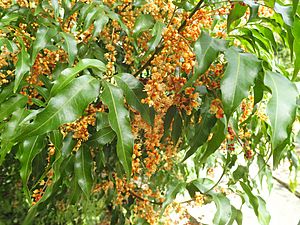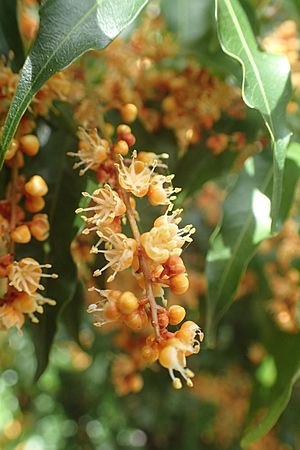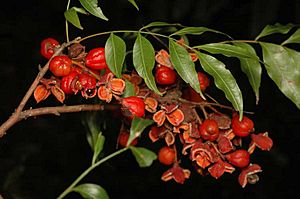Fine-leaved tuckeroo facts for kids
Quick facts for kids Fine-leaved tuckeroo |
|
|---|---|
 |
|
| Lepiderema pulchella in Coffs Harbour Botanic Garden | |
| Scientific classification |
|
| Kingdom: | Plantae |
| Clade: | Tracheophytes |
| Clade: | Angiosperms |
| Clade: | Eudicots |
| Clade: | Rosids |
| Order: | Sapindales |
| Family: | Sapindaceae |
| Genus: | Lepiderema |
| Species: |
L. pulchella
|
| Binomial name | |
| Lepiderema pulchella Radlk.
|
|
| Script error: The function "autoWithCaption" does not exist. | |
Script error: No such module "Check for conflicting parameters".
The Lepiderema pulchella, also known as the Fine-leaved Tuckeroo, is a beautiful flowering plant. It belongs to the Sapindaceae family, which includes many types of trees and shrubs. This special tree is found only in certain coastal areas of eastern Australia.
The Fine-leaved Tuckeroo is known for its shiny, light green leaves. These leaves have many smaller parts called leaflets. It also produces lovely yellow-orange flowers and interesting brown, round fruits.
Contents
What Does the Fine-leaved Tuckeroo Look Like?
The Fine-leaved Tuckeroo is a tree that can grow quite tall, reaching up to 15 meters (about 49 feet) high. Most parts of the tree are smooth and do not have hairs.
Leaves and Branches
Its leaves are made up of several smaller leaflets, like a feather. Each leaf is usually 70 to 150 millimeters (about 3 to 6 inches) long. They grow on a stem called a petiole, which is 15 to 25 millimeters long. There are usually four to fourteen leaflets on each leaf. These leaflets are narrow and shaped like a spear, measuring 25 to 80 millimeters long and 10 to 25 millimeters wide. Their edges are often wavy.
Flowers and Fruit
The flowers of the Fine-leaved Tuckeroo grow in groups called panicles. These flower clusters are 55 to 120 millimeters long and appear where the leaves meet the stem. Each tiny flower sits on a small stalk, about 2 to 3.5 millimeters long.
The flowers are a bright yellow-orange color and are only 2 to 3 millimeters long. They have small leaf-like parts called sepals, which are 1.5 to 3.5 millimeters long. After the flowers, the tree produces fruit. The fruit is a brown, round or three-lobed capsule, about 8 to 10 millimeters wide. Inside, you'll find dark brown seeds, each about 5 millimeters long. The fruit usually ripens in December.
Where Does the Fine-leaved Tuckeroo Grow?
This tree loves to grow near water. You can find the Fine-leaved Tuckeroo along the banks of creeks and rivers. It also grows at the edges of rainforests. Its natural home stretches from the far south-eastern part of Queensland down to the Tweed River in New South Wales.
How is the Fine-leaved Tuckeroo Protected?
The Fine-leaved Tuckeroo is considered a special plant. The Queensland Government has listed it as "vulnerable" under their Nature Conservation Act 1992. This means that the tree is at risk of becoming endangered if we don't protect its habitats. Protecting these areas helps make sure the Fine-leaved Tuckeroo can continue to grow and thrive for many years to come.
 | Mary Eliza Mahoney |
 | Susie King Taylor |
 | Ida Gray |
 | Eliza Ann Grier |



